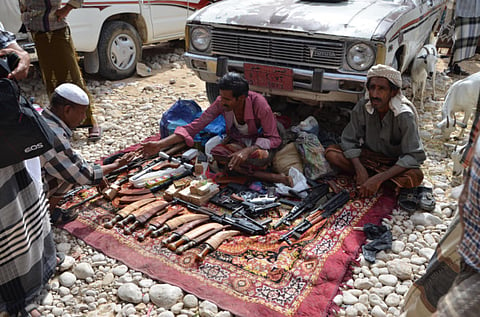Yemen chaos sparks growing demand for firearms
Brisk weapons business all the more conspicuous in relatively peaceful province of Hadramout

Al Mukalla: Abu Abdullah never felt the need to arm himself in his home city of Al Mukalla. However, when Al Qaida swiftly stormed the coastal city in south Yemen in April, chaos erupted.
Hundreds of people, including some of his neighbours, went on a looting rampage through government offices while Al Qaida was busy tightening its grip on the city.
The middle-aged man, who owns a small grocery store, feared looters would break into his store or residence and decided it was best he arm himself to protect his family and business.
Unlike other troubled areas of Yemen, the vast province of Hadramout is relatively peaceful and its residents are rarely armed.
Abu Abdullah found himself in unfamiliar territory while he was looking to purchase a gun.
After doing some searching, Abu Abdullah learned of an arms trader in another city who was selling weapons and also giving lessons in using firearms.
The automatic rifle he purchased cost him 350,000 Yemeni rials (Dh5,969) but Abu Abdullah says he cannot put a price tag on his peace of mind.
“I feel much more secure now,” he told Gulf News.
Abu Abdullah is one of many Yemenis who have found themselves purchasing weapons for personal protection in a country that is quickly sinking into all-out civil war.
Violence flared up last year when Iranian-backed Al Houthi militants overthrew the internationally recognised government of Abd Rabbo Mansour Hadi, forcing him and his government into exile in Saudi Arabia.
On March 26, Riyadh led a coalition of mostly Arab states in a military campaign against the Al Houthis, targeting their weapons depots and infrastructure.
Despite the fact that Hadramout is Yemen’s largest province, it only has two arms markets.
A three-hour drive from Al Mukalla, a small arms market in the rugged valley of Dawan is attracting many customers.
Every Wednesday, Ebrahim Banouaira parks his Toyota pickup in the middle of the market to sell weapons ranging from small rifles to different brands of AK-47s. He tells Gulf News that there has been a sharp upswing in demand for such weapons in recent weeks.
Despite having a degree in science from a local university, Banouaira moonlights as an arms dealer at the market.
“Most weapons come either from local people or traders from the Shabwa and Mareb provinces,” he explains. “More residents from Hadramout province however are coming to buy weapons because they no longer feel safe,” he said.
The price of ammunition for some weapons has soared due to the surging demand. For example, the prices of bullets range from 400 Yemeni rials — almost $2 — to 1,600 rials.
People prefer to buy AK-47 guns, which cost between Dh4,000 to Dh6,000 depending on where they have been manufactured, and their quality and make, Banouaira adds.
Israeli-made automatic weapons are also on sale in the market, and sellers say they come from outside traders.
Days before Al Qaida overran the military base in Al Mukalla in April, the army smuggled out most of the light arms and ammunition allocated to the 27th Brigade and sold them to the local people, according to a tribal leader who spoke to Gulf News on the condition of anonymity.
However, only a handful of the smuggled arms are on sale at local markets. The majority of those stocks, he says, have been rushed to bigger battlegrounds in Yemen’s south, especially in the city of Aden.
Aydha Bin Sounkar, another arms seller, says that the demand for arms is outstripping supply.
Analysts warn that the proliferation of arms sales in Hadramout and recruiting for both pro-Hadi forces and Al Qaida will soon manifest in confrontations between local tribes.
Taha Bafadhel, a freelance journalist, says that the overflowing business in arms in Hadramout is a new phenomenon. “Arms were present only in tribal and social traditions, but with the proliferation of military training camps, the province is teetering on the verge of a violent explosion.”
Sign up for the Daily Briefing
Get the latest news and updates straight to your inbox



